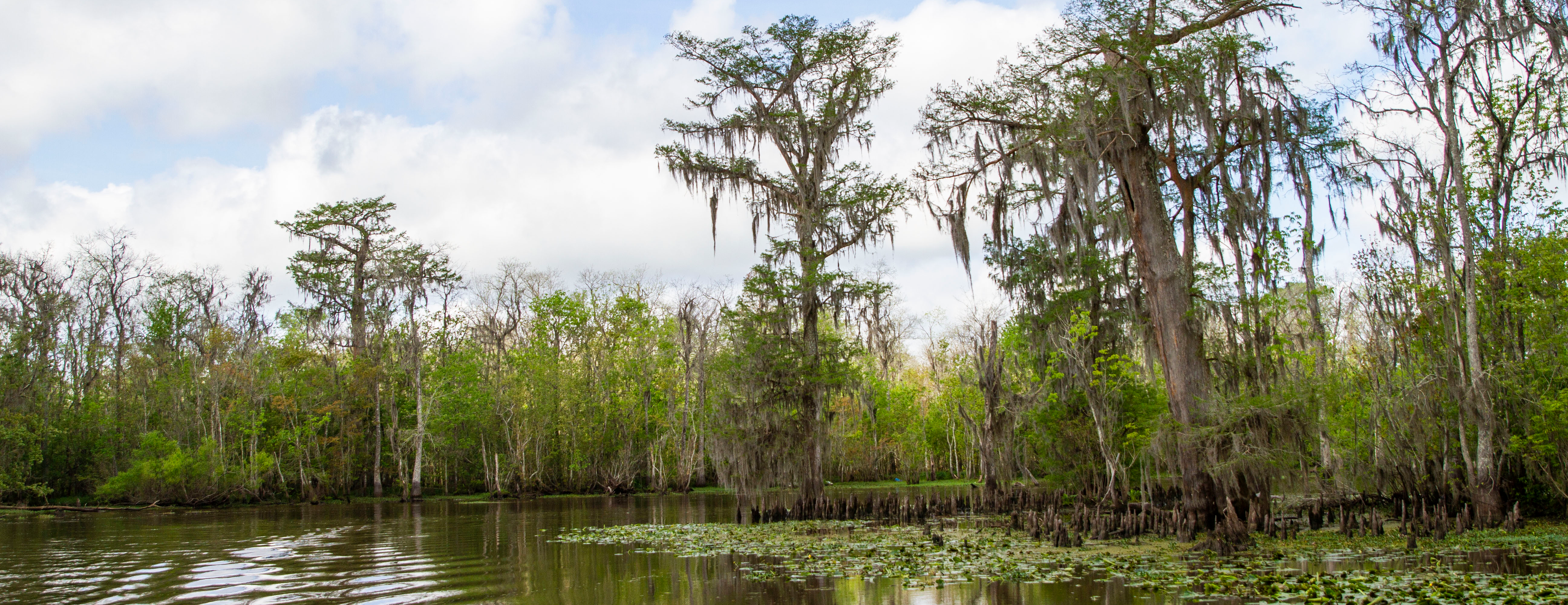Restore the Mississippi River Delta is a coalition of local and national environmental organizations working within Louisiana to rebuild and restore the coast. The coalition has been conducting public opinion research among Louisiana voters since 2013 and media research about coastal issues since 2016.
Media research has explored the core themes, topics, messengers and tone that have driven the conversation in both national and local media around coastal restoration and coastal land loss. The goal of this research has been to better understand patterns and changes in the conversations through the years.
Hattaway Communications worked on behalf of Restore the Mississippi River Delta to synthesize the findings from the many years of public opinion and media research. This report discusses findings primarily between 2017 and 2023.

A Legacy of Support for Coastal LouisianaLouisianians are proud of their unique cultures and communities—and they’re committed to preserving their way of life for future generations in the face of changing weather and climate conditions. From northern Louisiana to the coast, across communities and demographic divides, statewide surveys and media coverage over the past decade show widespread support for coastal restoration efforts that protect the ecosystem as well as the jobs, safety and well-being of Louisianians. There is no single solution to Louisiana’s land loss crisis. The state has embraced a wide array of projects designed to rebuild the natural infrastructure, including sediment diversions, marsh creation through dredging and reef building through oyster shell recycling. The critical guiding strategy behind these efforts is the Louisiana Coastal Master Plan. The plan, a national model for coastal restoration and protection, is built on the latest data and deserves credit for placing Louisiana at the forefront of climate innovation. Updated every five to six years since 2007, it creates a path for government, researchers, nongovernment organizations and other partners to collaborate and make smart investments that rebuild the ecosystem and restore Louisianians’ sense of security in their homes. The 2023 update to the Coastal Master Plan outlines Louisiana’s plans for the future of coastal restoration and the completed projects that are making a difference. Louisianians have proved that they know what works to safeguard their cultures and communities. Uniting in support of the Coastal Master Plan is uniting in support of Louisiana’s legacy. |
Louisianians Support Coastal Restoration
Louisianians are widely united in support of coastal restoration—and they have been for the past decade.
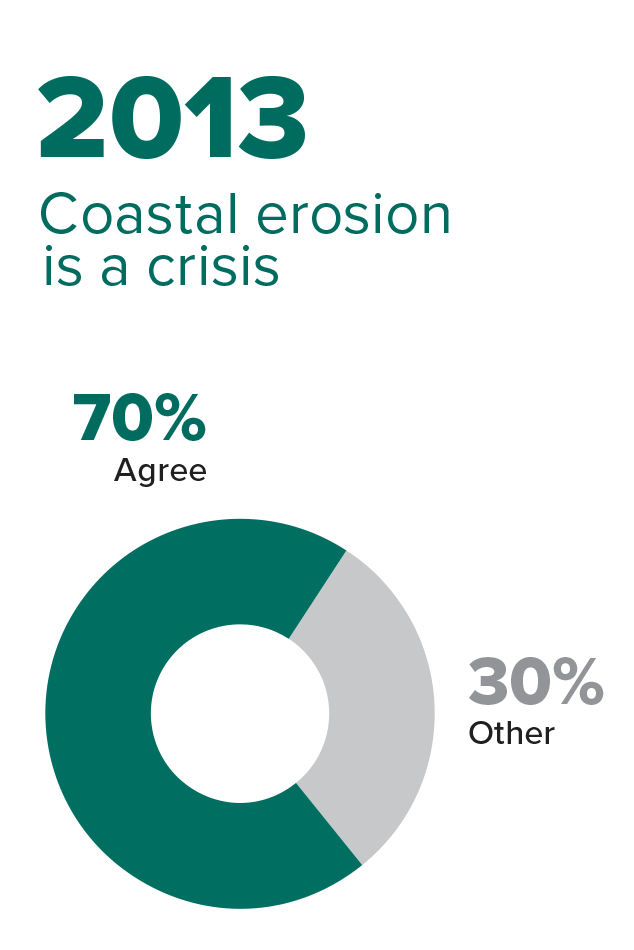
Louisianians are widely united in support of coastal restoration—and they have been for the past decade. Restore the Mississippi River Delta has released polling results from Louisiana voters regularly over the past twelve years and the near-unanimous support for coastal restoration has never wavered. Review past polling data below:
- Louisiana Voters Overwhelmingly Support Large Scale Coastal Restoration – April 2023
- New Poll Shows Over 80% of Coastal Louisianans Support Sediment Diversions – August 2021
- New Poll Shows Vast Majority of Louisiana Voters Concerned About Coastal Land Loss, Climate Change – August 2019
- New Poll Shows Louisianians’ Overwhelming Bipartisan Support for Coastal Restoration – September 2018
- New Poll Shows Majority of Louisianians View Coastal Land Loss as a “Crisis” – January 2017
- Louisiana Coastal Issues Poll 2016 – December 2016
- New Poll Finds 94 Percent of Louisianians Will Consider a Candidate’s Coastal Platform When Voting – September 2015
- Poll: Hunters and Anglers Overwhelmingly Support Gulf Clean-up – September 2012
- New Poll: Gulf Restoration: Something Everyone Can Agree On – April 2011
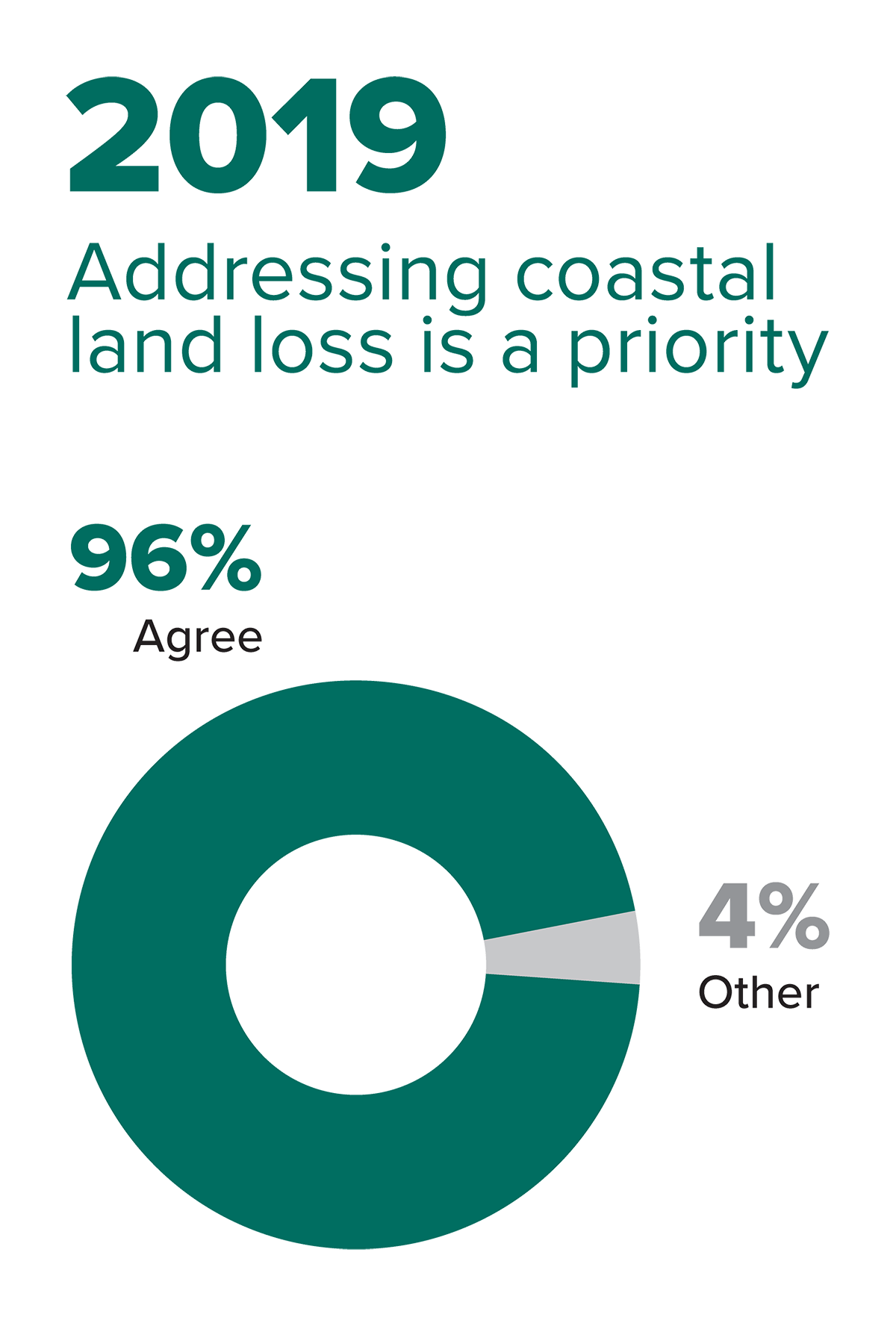
In 2019, Louisiana voters were deeply concerned about the state’s coastal land loss crisis and supported coastal restoration efforts to address it, according to a poll conducted by BDPC, LLC + Pinsonat. The poll shows that 98 percent of voters say officials should work to maintain as much of Louisiana’s coast as possible, even if it’s not possible to restore the original footprint; and 97 percent want their elected officials to prioritize tackling coastal land loss when in office.
See 2019 polling results | Louisiana Coastal Issues Poll 2019 | Listen to our podcast
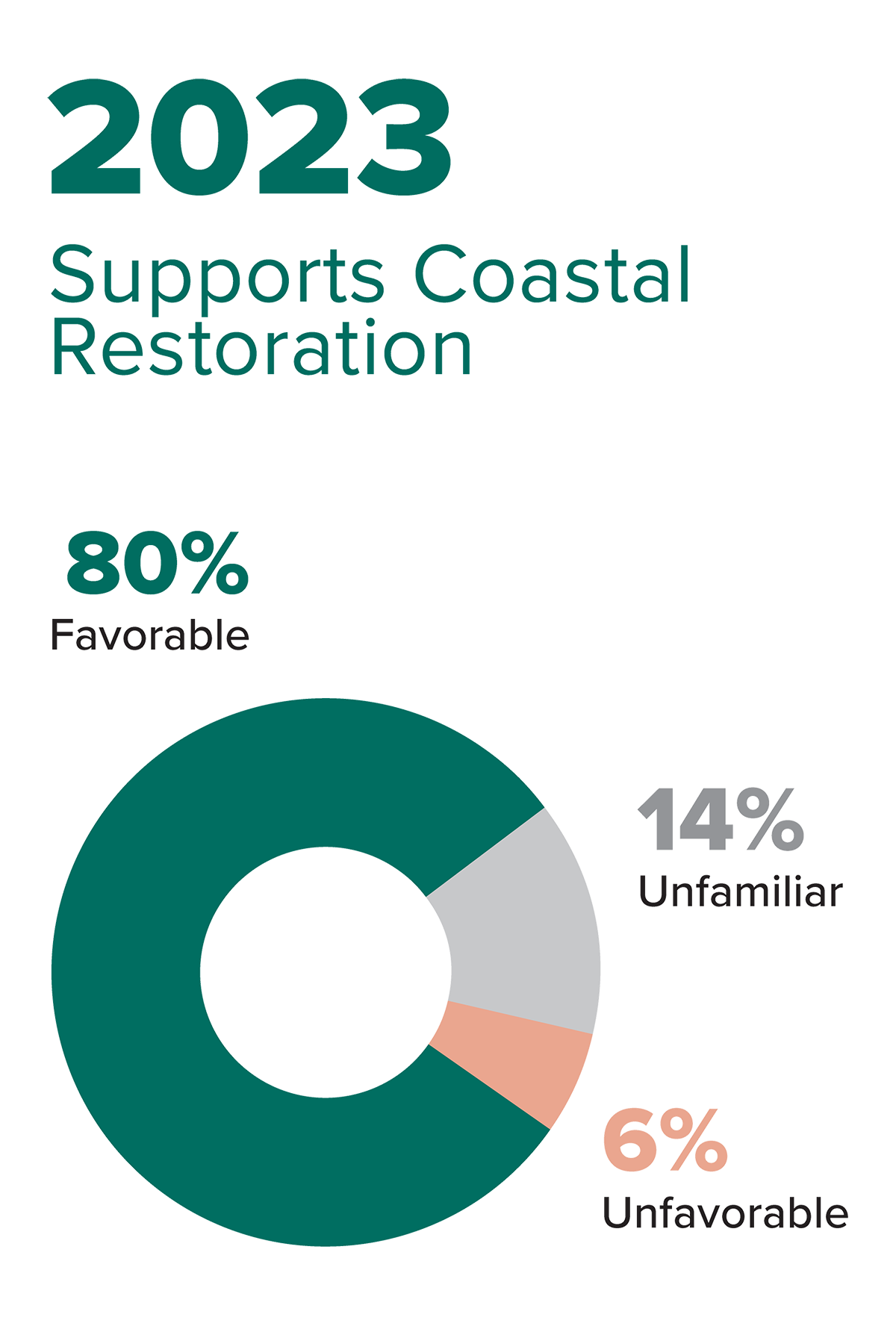
In 2023, there is widespread, bipartisan support for action to address Louisiana’s urgent land loss crisis through large-scale coastal restoration projects, according to a new poll released today by Global Strategy Group (GSG) on behalf of Restore the Mississippi Delta. An overwhelming 73 percent of Louisiana coastal voters support sediment diversions that address coastal restoration, up from 68 percent in 2021. Support is not limited to the coast; the same number of voters support diversions statewide (73 percent).
See full polling results | Read the press release | Read the polling factsheet
|
Louisianians believe that coastal restoration protects their way of life and culture.
While more than three-fourths (77%) of 2017 voters said coastal land loss poses a very serious threat to the culture and way of life in coastal communities, residents were also hopeful that coastal restoration could help. More recently, two-thirds (67%) of 2023 registered voters said they thought sediment diversions would have a positive impact on the culture and way of life in coastal Louisiana communities.
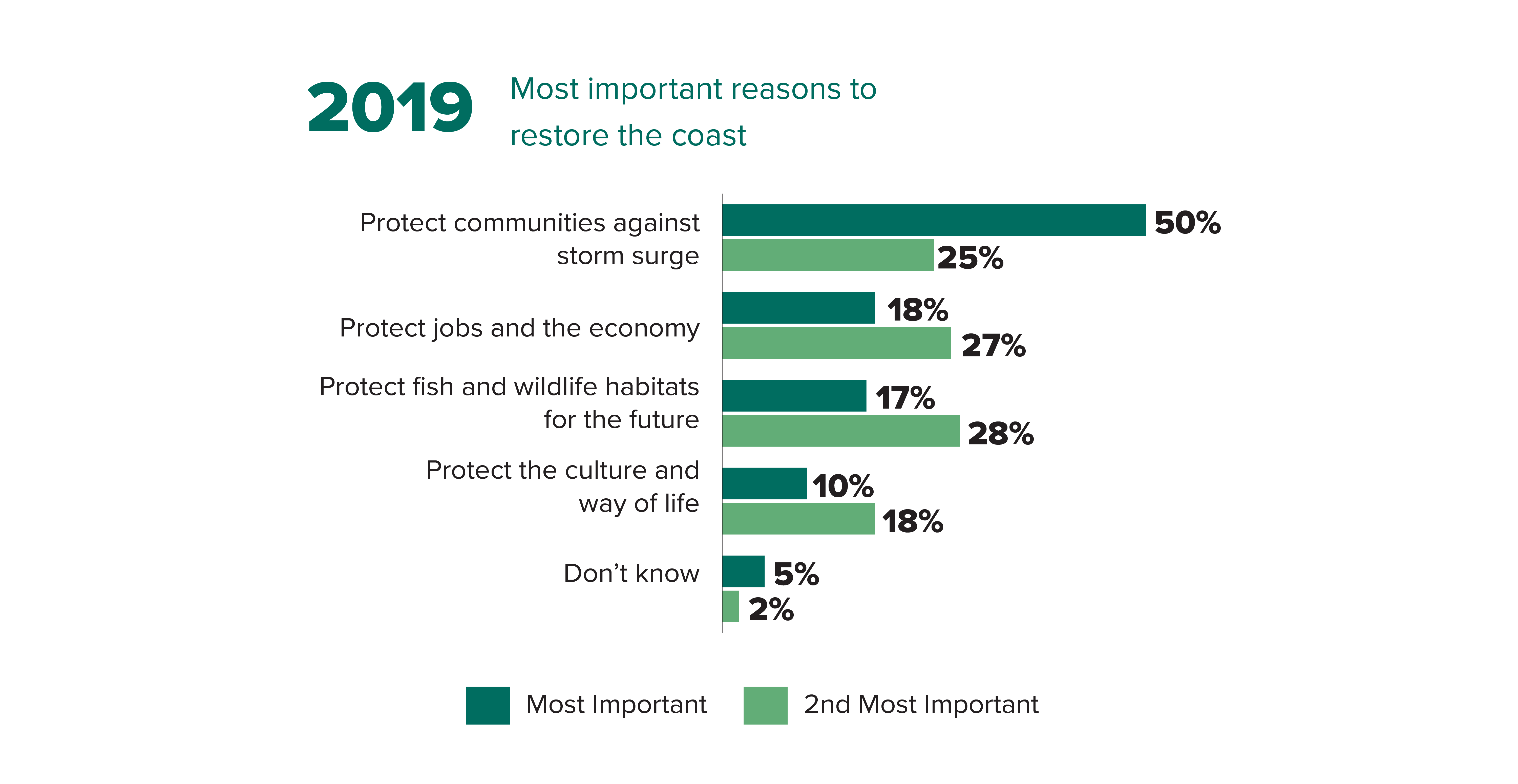
Half of 2019 voters said the most important reason to restore the coast is to protect communities against storm surges, and another quarter said it’s the second most important reason.
Although coastal restoration is not always the media’s main focus, the media has underscored how coastal restoration keeps communities safe, with coverage about how flood control projects and natural infrastructure protect people’s lives and livelihoods throughout the hurricane season.
Louisianians feel an immense sense of urgency around coastal restoration and land loss. They are concerned that coastal land loss will directly impact them, their families and Louisiana in the next 10 years—if they have not been impacted already. In 2023, half (54%) of registered voters statewide said they thought that coastal land loss would directly impact them and their families in the next 10 years. In 2021, 86% of coastal residents said stronger hurricanes and increased coastal flooding are already having a serious impact on Louisiana, and another 70% agreed that stronger hurricanes and increased coastal flooding are already having an impact on them and their families.
The media has reflected this sense of urgency throughout the years, and that urgency has only increased in recent coverage. In 2021–2022, urgency was a major driver of conversation due to widespread agreement that we are at a tipping point with climate change and that we need to be swift and proactive to save our coastal communities. Between September 2021 and August 2022, the idea that we need to “act now” to save the coast or to mitigate climate change appeared in 22% of all articles sampled.

The public and the media are aware of and support the idea of coastal restoration, but fewer people are familiar with the Coastal Master Plan—four in five registered voters in 2023 who were familiar with the plan were in favor of it, but a majority of the public was still unfamiliar. The lack of public awareness is reflected in the media: the Coastal Master Plan is not always explicitly connected to the popular coastal restoration projects it covers.
The Coastal Master Plan is the backbone that supports a range of policies and projects that Louisianians value, but many residents still haven’t heard of it. While the projects are popular, the work can take time and care to build and produce results—which makes it less attractive to the media. The plan lays out the direction forward, and people are united in support of its projects that protect their cultures and communities.
To ensure these essential projects continue, Louisiana voters can learn more about the plan and its impacts. By talking about the plan with friends, family members and officials, voters can spread awareness and support for coastal restoration work.
Local perspective
“Restoring the New Orleans Landbridge will provide storm protection for the 1.5 million people that live near and surrounding Lake Pontchartrain. The Coastal Master Plan ensures needed protection and restores the coast we call home.” – LaVerne Toombs, small business owner, life long Louisiana resident |
What Do Louisianians See as the Benefits of Coastal Restoration?
Louisianians know that coastal restoration safeguards their livelihoods—their homes, infrastructure and economy.
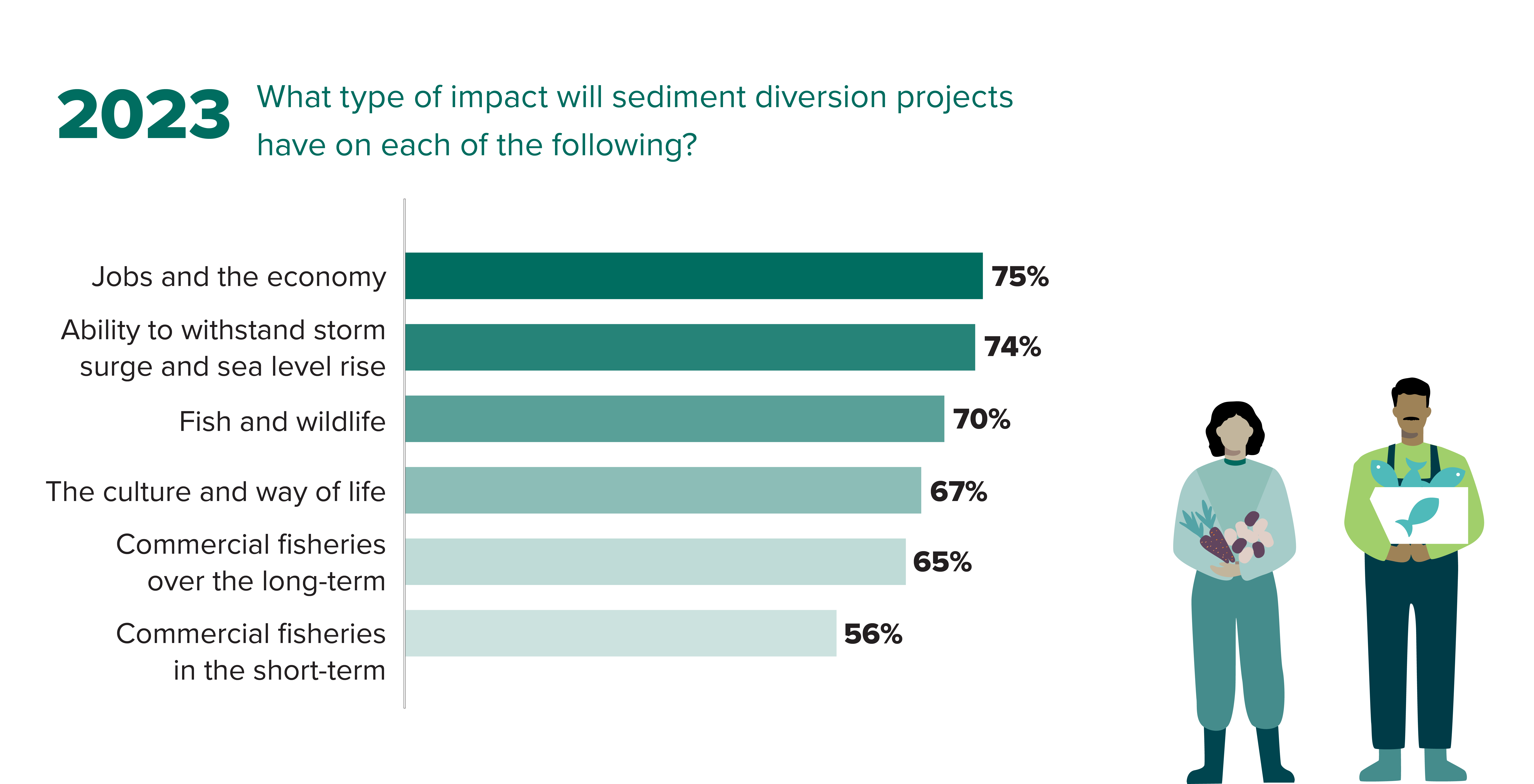
Why Do Louisianians Support Coastal Restoration?
|
What Coastal Restoration Efforts Do Louisianians Support?
Louisianians feel that coastal restoration action is important for maintaining as much of the coast as possible, even if it will never return to its original footprint. They understand they can’t make it perfect, but they think it’s important to make it better.
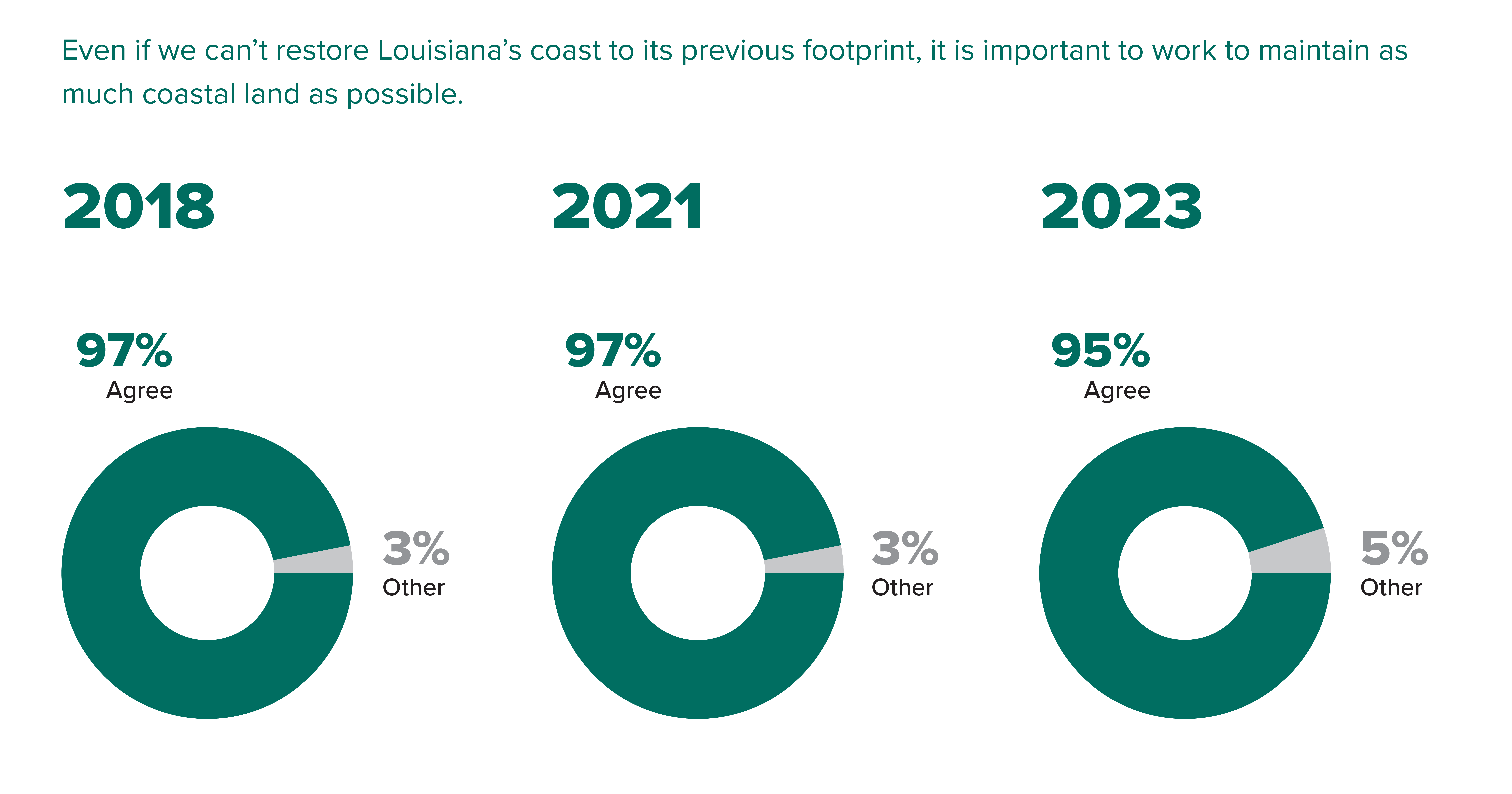
Since 2021, the media has also increased coverage of the need to protect coastal communities equitably. Recent hurricanes and natural disasters have illustrated the challenges faced by many Indigenous communities along the Louisiana coast, such as Grand Bayou Village and the Pointe-au-Chien Indian Tribe. Though these articles don’t tend to frame coastal restoration as the answer, the media does raise awareness of how certain communities are disproportionately impacted by worsening weather conditions.
For example, a 2021 article, For Louisiana’s Coastal Tribes, “Being at the End of the Earth Is a Dangerous Place,” described the devastation Native Americans living in swamps and on sinking land experienced during Hurricane Ida. They lost homes, cultural sites and important infrastructure. Some tribes have been pushed into these dangerous areas. They then have difficulty getting help from the federal government to develop protection against storm surges and to aid in the aftermath of destructive storms. Another article titled Who Will Protect Communities of Color from Climate Disaster? highlighted that Black, Brown and Indigenous communities across the Gulf Coast are being disproportionately harmed by pollution and damaging storms and described the failure of governments to protect those communities from toxins and the repercussions of climate change.
Louisianians know that they are on the front lines of changing weather and climate conditions. They value coastal restoration work because it restores their sense of security and their cultural legacy.
Local perspective
– Warren Coco, small business owner, life long Louisiana resident Learn about the River Reintroduction into Maurepas Swamp project |
About Restore the Mississippi River Delta
Restore the Mississippi River Delta is a coalition of the Environmental Defense Fund, the National Audubon Society, the National Wildlife Federation, Coalition to Restore Coastal Louisiana and Pontchartrain Conservancy. Together, we are working to rebuild coastal Louisiana’s nationally significant landscape to protect people, wildlife and jobs. Our mission is to advance an equitable, safer and flourishing coast for Louisiana’s communities, ecosystems and economy. Our work is made possible through the Walton Family Foundation and other funders.
If you would like to contact us or have questions about this report, please reach out to us at info@mississippiriverdelta.org.
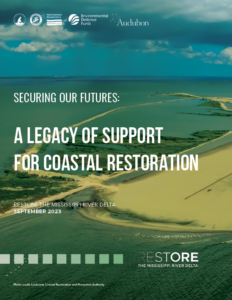
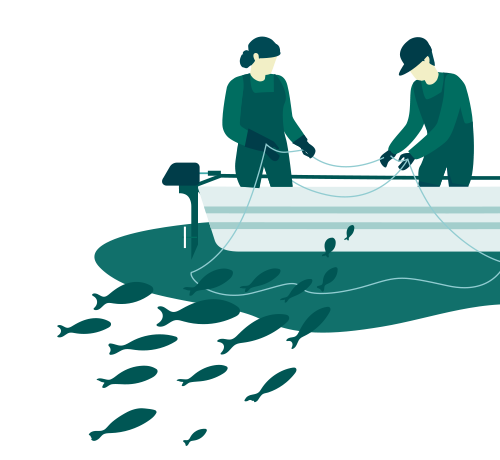 Residents understand how important coastal restoration is to the state and are willing to support most actions that push forward coastal protection:
Residents understand how important coastal restoration is to the state and are willing to support most actions that push forward coastal protection:
 Coastal Land Loss and Climate Change: Louisianians support coastal restoration because they see it as an essential step in protecting themselves from urgent concerns about coastal land loss and climate change. Two-thirds of 2023 registered voters agreed that if we fail to act, climate change will have a serious impact on future generations of Louisianians (65%) and that climate change is already having a serious
Coastal Land Loss and Climate Change: Louisianians support coastal restoration because they see it as an essential step in protecting themselves from urgent concerns about coastal land loss and climate change. Two-thirds of 2023 registered voters agreed that if we fail to act, climate change will have a serious impact on future generations of Louisianians (65%) and that climate change is already having a serious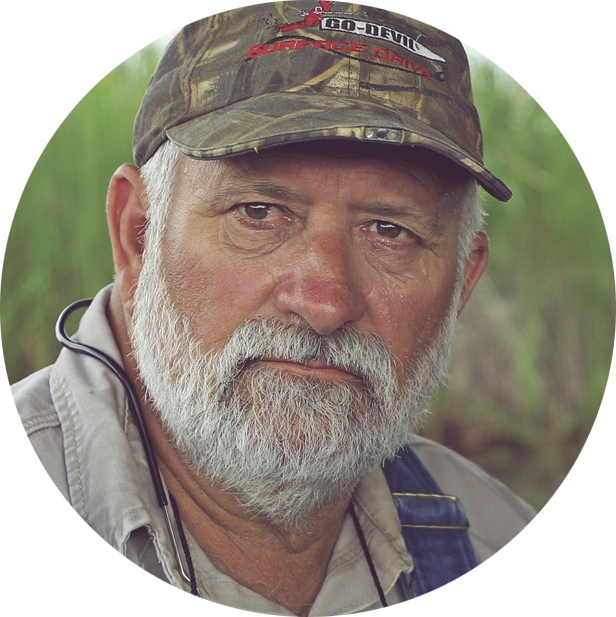 “The Maurepas Swamp diversion is going to decrease the salinities and maybe help get the trees to grow. We don’t need more open water, we need more solid marshland, and what that’s going to do is sustain the land we have. It’ll reduce the storm surge; it’s habitat for wildlife and fish, it’s habitat for everything.”
“The Maurepas Swamp diversion is going to decrease the salinities and maybe help get the trees to grow. We don’t need more open water, we need more solid marshland, and what that’s going to do is sustain the land we have. It’ll reduce the storm surge; it’s habitat for wildlife and fish, it’s habitat for everything.” 